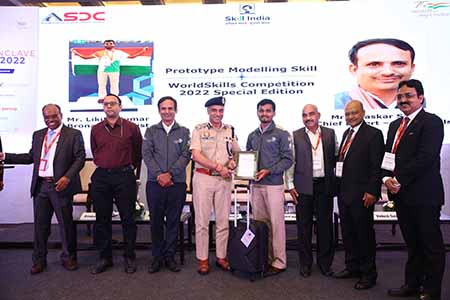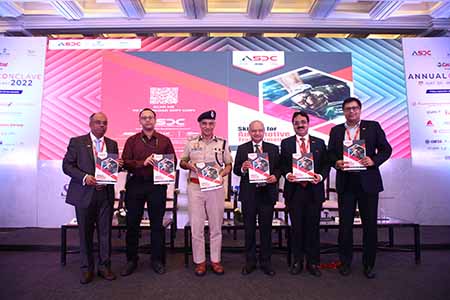New Delhi: Annual Conclave of the Automotive Skills Development Council (ASDC), the first Sector Skill Council of India, held at Hotel Hayat in New Delhi on September 23, brought together the biggest names in the Indian auto industry once again. Themed “Kushal Yuva – Samruddh Bharat”, the Conclave had 500+ participation by several senior bureaucrats and auto industry stalwarts, including CEOs and senior representatives from the Indian and global manufacturers, who presented their perspectives about the auto industry‘s role in emerging India and industry expectation from the skilling ecosystem. Renowned Guests along with ASDC officials and industry partners were also released the Annual Handbook. ASDC also announced Award of Excellence for different categories during the event to recognize and facilitate the efforts made by the training partners, accessor and industry partners.

The theme draws attention to endowing the youth with skills that can make them resilient to evolving challenges, improve their productivity in jobs, increase employability, and prepare them for the future. The conclave focused on bringing industry experts on-board to provide key insights for building a skilling ecosystem by partnering with the industry and making skills aspirational. The conclave boasted a wide range of industry sponsors, including Castrol, Royal Enfield, Toyota, Yuvashakti Foundation, AXALTA, incaetek, tcsion, and more.

This was inaugurated by the Shri S.P. Baniwal, Special Commissioner of Delhi Police, Mr. Arindam Bhattacharya, Director (Development Partnership Administration), Ministry of External Affairs and Col. A. K. Chandel, Senior Head, NSDC & Technical delegate Assistant, World Skills India as Guests of Honour. ASDC’s President Vinod Aggarwal welcomed the Guest of Honours warmly and explained the objective of the event. The day-long event focused on various panel discussions on industry expectations from the skilling ecosystem, vocational skills institutions and industry training centres’ perspective on challenges and opportunities associated with skilling, and the role of the state to mobilize and make skills aspirational in the automotive skilling ecosystem.
Dr. N.S. Kalsi, Chairman, NCVET emphasized that to address the skill deficit, India needs to extend high technical and vocational courses to improve employability. He said that recently ASDC has been granted recognition as an Awarding Body status by NCVET and ASDC is working well for upskilling and re-skilling. NCVET has developed several QP, aligned with NSQF for the automobile industry especially in Robotics, EV and align technology, AR/VR, Big Data, IoT and they are the future job that will create several jobs.
Shri S.P. Baniwal, IPS Special Commissioner of Delhi, Police underlined that the YUVA program, which was started with the help of Ministry of Skill Development and Entrepreneurship, is meant to provide employment-oriented skills to those who are first-time criminals, victims of crimes and those who have propensity to commit crime. It not only mirrors humane and compassionate face of Delhi Police, but also serves the prime objective of policing, i.e. prevention of crime.
Mr. Vinkesh Gulati, Treasurer ASDC & Chairman Research and Academy at FADA said: ASDC has facilitated training for 60,000 new skilled employees in the automotive sector in FY22. The chunk of these associates joined various OEMs, suppliers, as well as vehicle dealerships, under the government’s apprenticeship programme, which allows for on-the-job training and evaluation of an individual, before they get the course certification from ASDC.
Earlier, in his welcome address, Mr. Vinod Aggarwal, President ASDC said: “The Indian auto industry, like the rest of the global automobile manufacturing sector, is going through a massive and disruptive change. ASDC, being a major stakeholder of the Indian automobile industry ecosystem, aims to prepare the country’s workforce and make it future-ready. This way, ASDC not only helps the auto industry of the country on a larger scale but helps the Indian economy at large and the AtmaNirbhar Bharat programme as well.”
Mr. Arindam Lahiri, CEO of ASDC said: “The council has teamed up with industry and training providers to develop various certification programmes with companies and has certified several candidates. Besides, it has also launched e-learning courses for the aspirants, in which people have been certified.”
The discussion during the ASDC Annual Conclave revolved on the need to reinvent people, places, and practices to embrace digitization and prepare brick and mortar companies for a future world. The panel members discussed the belief that organisations need to prepare for the future age with clear strategy, clarity of the leadership team for embracing technology and enabling stakeholders to work collaboratively with right skills, maturity, and strategy.












